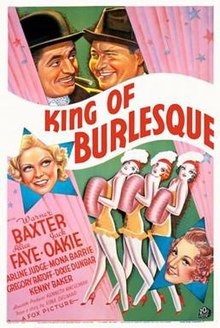This is a list of notable events in music that took place in the year 1936.
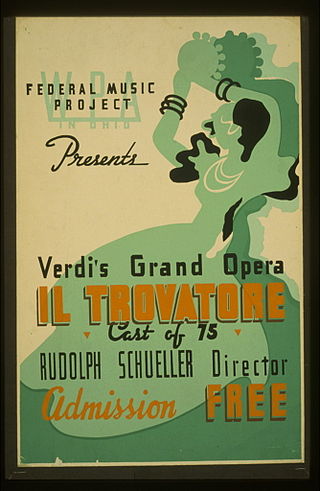
This is a list of notable events in music that took place in the year 1937.
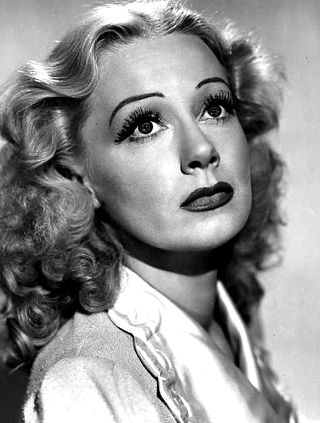
June Havoc was an American actress, dancer, stage director and memoirist.
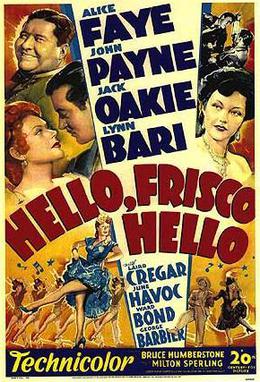
Hello, Frisco, Hello is a 1943 American musical film directed by H. Bruce Humberstone and starring Alice Faye, John Payne, Lynn Bari, and Jack Oakie. The film was made in Technicolor and released by 20th Century-Fox. This was one of the last musicals made by Faye for Fox, and in later interviews Faye said it was clear Fox was promoting Betty Grable as her successor. Released during World War II, the film became one of Faye's highest-grossing pictures for Fox.

Dancing Lady is a 1933 American pre-Code musical film starring Joan Crawford and Clark Gable, and featuring Franchot Tone, Fred Astaire, Robert Benchley, and Ted Healy and His Stooges. The picture was directed by Robert Z. Leonard, produced by John W. Considine Jr., and was based on the novel of the same name by James Warner Bellah, published the previous year. The movie had a hit song in "Everything I Have Is Yours" by Burton Lane and Harold Adamson.
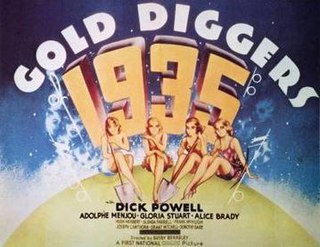
Gold Diggers of 1935 is an American musical film directed and choreographed by Busby Berkeley, his first time as a film's overall director. It stars Dick Powell, Adolphe Menjou, Gloria Stuart, Alice Brady, Hugh Herbert, Glenda Farrell, and Frank McHugh, and features Joseph Cawthorn, Grant Mitchell, Dorothy Dare, and Winifred Shaw. The songs were written by Harry Warren (music) and Al Dubin (lyrics). The film is best known for its famous "Lullaby of Broadway" production number. That song, sung by Shaw, also won the Academy Award for Best Original Song. The screenplay was by Manuel Seff and Peter Milne, based on a story by Robert Lord, who also produced the film, and Milne.

Gypsy is a 1962 American musical film produced and directed by Mervyn LeRoy. The screenplay by Leonard Spigelgass is based on the book of the 1959 stage musical Gypsy: A Musical Fable by Arthur Laurents, which was adapted from the 1957 autobiography Gypsy: A Memoir by Gypsy Rose Lee. Stephen Sondheim wrote the lyrics for songs composed by Jule Styne. The film was remade for television in 1993.
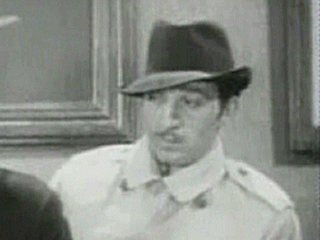
The Stolen Jools is a 1931 American pre-Code comedy short produced by the Masquers Club of Hollywood, featuring many cameo appearances by film stars of the day. The stars appeared in the film, distributed by Paramount Pictures, to raise funds for the National Vaudeville Artists Tuberculosis Sanitarium. The UCLA Film and Television Archive entry for this film says—as do the credits—that the film was co-sponsored by Chesterfield cigarettes to support the "fine work" of the NVA sanitarium.

Marjorie Weaver was an American film actress of the 1930s through the early 1950s.

Dan Seymour was an American character actor who frequently played villains in Warner Bros. films. He appeared in several Humphrey Bogart films, including Casablanca (1942), To Have and Have Not (1944) and Key Largo (1948).

Colleen is a 1936 American romantic musical comedy film directed by Alfred E. Green and starring Dick Powell, Ruby Keeler, and Joan Blondell. It was produced and distributed by Warner Bros. and was the seventh and final picture starring both Keeler and Powell.

Hit the Deck is a 1930 American pre-Code musical film directed by Luther Reed and starring Jack Oakie and Polly Walker, with Technicolor sequences. It was based on the 1927 musical Hit the Deck, which was itself based on the 1922 play Shore Leave by Hubert Osborne. It was one of the most expensive productions of RKO Radio Pictures up to that time, and one of the most expensive productions of 1930. This version faithfully reproduced the stage version of the musical.

Tin Pan Alley is a 1940 musical film directed by Walter Lang and starring Alice Faye and Betty Grable as vaudeville singers/sisters and John Payne and Jack Oakie as songwriters in the years before World War I.

The Hard Way is a 1943 Warner Bros. musical drama film starring Ida Lupino, Dennis Morgan, and Joan Leslie. Directed by Vincent Sherman, it is based on a story by Irwin Shaw which was reportedly based on Ginger Rogers' relationship with her first husband, Jack Pepper and her own mother, Lela.

Burlesque is a 2010 American backstage musical film written and directed by Steven Antin. It stars Cher, Christina Aguilera, Kristen Bell, Cam Gigandet, Stanley Tucci, Julianne Hough, Alan Cumming, and Peter Gallagher, and features cameos from Dianna Agron, and James Brolin. The film tells the story of Ali (Aguilera), an aspiring singer who leaves her small hometown for Los Angeles, where she becomes a dancer at a struggling burlesque lounge owned by Tess (Cher). After a performance is sabotaged by her rival, Nikki (Bell), Ali sings the song herself, impressing Tess and leading to her becoming the main attraction of the lounge. Burlesque marks Aguilera's first leading role, as well as Cher's first musical performance on screen.

American burlesque is a genre of variety show derived from elements of Victorian burlesque, music hall, and minstrel shows. Burlesque became popular in the United States in the late 1860s and slowly evolved to feature ribald comedy and female nudity. By the late 1920s, the striptease element overshadowed the comedy and subjected burlesque to extensive local legislation. Burlesque gradually lost popularity beginning in the 1940s. A number of producers sought to capitalize on nostalgia for the entertainment by recreating burlesque on the stage and in Hollywood films from the 1930s to the 1960s. There has been a resurgence of interest in this format since the 1990s.
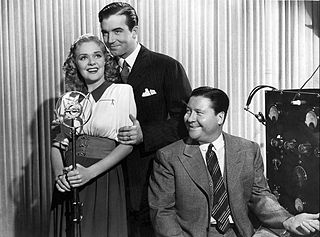
The Great American Broadcast is a 1941 comedy film directed by Archie Mayo. It stars Jack Oakie, Alice Faye and John Payne.

Joey Faye was an American comedian and actor.

Navy Blues is a 1941 American musical comedy film directed by Lloyd Bacon and written by Jerry Wald, Richard Macaulay, Arthur T. Horman and Sam Perrin. The film stars Ann Sheridan, Jack Oakie, Martha Raye, Jack Haley, Herbert Anderson, Jack Carson, Jackie Gleason and William T. Orr. The film was released by Warner Bros. on September 13, 1941.

Adrian Michael Morris was an American actor of stage and film, and a younger brother of Chester Morris.
